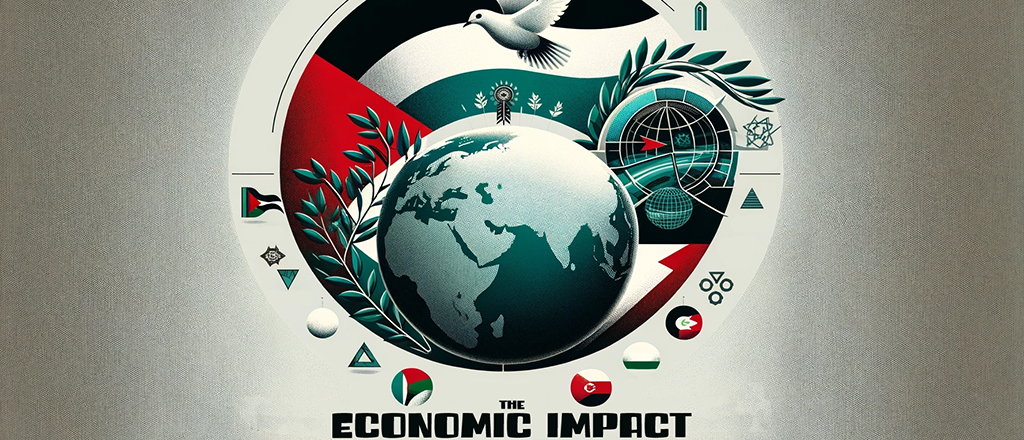Impact of Gaza Israel War on Global Economy and Egypt

It has been more than three months since escalation between Israel and Hamas began. Israel started ground operations in Gaza strip along with airstrikes, destroying hospitals, refugee camps and mosques, causing thousands of causalities and injuries, while millions of People are displaced due infrastructural damages.
The Israel's aggression in now resulting in humanitarian crisis in Gaza due to fewer supplies of food, fuel, water and medical equipment. Moreover, closing of borders, and restrictions on flow of goods and services by Israel is not only impacting Gaza but also the global economy supply chain as well.
The tensions in Red sea escalated as result of attacks of Houthi group on ships further raise trade and economic concerns between Middle east, Asia and Europe. The Red Sea is considered a vital corridor for transporting oil. Commercial ships pass through it to reach the Suez Canal. Houthi attacks endanger oil ships and oil shipments, leading to a negative impact on the movement of global oil trade.
This article will explore the consequences of Israel's aggression in Gaza and its effects on both the Gaza region and the global economy. Furthermore, the significant role played by Egypt in de-escalating the situation between Israel and Hamas will be emphasized.
Situation in Gaza After Three Months of War
Israel aggression in Gaza escalated after attack of Hamas on Israel in October 7, 2023. Israel began ground and air operation in Gaza with full power against civilians living in Gaza. Military Operation since October is resulting in devastating human and assets losses and deteriorating the living condition in Gaza.
Israeli forces are attacking civilian infrastructure from air and through tanks on the ground including hospital, refugee camps, schools and mosques. Additionally, Israel had also cut water and electricity supply to Gaza which is resulting in the humanitarian crisis due to unavailability of basic facilities. Israel has destroyed more than 355 thousand housing units and more than 126 government buildings. 13,523 schools, 306 mosques, 3 churches and more than 50 buildings operated by United Nations Relief and Works Agency (UNRWA) were damaged.
The medical sector in Gaza is facing severe crisis due to lack of fuel and medical supplies. As of January 2024, 27 out of 36 hospitals are out of service in the Gaza Strip, 110 medical clinics and medical centres are out of service, more than 102 ambulances were destroyed and the Israeli army is also besieging a number of hospitals and storming some of them, resulting in multiple casualties. More than 300 medical assistants including doctors and paramedics were martyred by Israeli armed forces, resulting in shortage of medical staff in the hospitals. Due to lack of basic facilities and medical equipment more than 360 thousand people are infected by the infectious disease spreading across the Gaza strip resulted in immense pressure on the medical sector.
Israel's Efforts to Forced Displacement of Residents from Gaza Strip
Israel is continuously bombarding civilian infrastructure, and throwing leaflets in Gaza strip arguing residents to leave North side of Gaza strip and shifted toward Palestinian city and Rafah Crossing on Egyptian border. This forced displacement is causing severe humanitarian crisis in the Gaza strip, moreover there are no positive measures taken by the Israeli side to return the residents of Gaza Strip to the north of the Strip.
The impact of Israeli military operations on the displacement of Palestinians is evident, exacerbating the refugee crisis and leading to a surge in irregular migration. This situation poses a threat to security and stability in the region, particularly with the potential for the conflict to escalate and broaden, potentially evolving into a regional war.
Gaza War and Rise in Migration
Ongoing political conflicts, crisis, economic challenges, and elevated unemployment rates persistently drive people to migrate in pursuit of improved living standards and job prospects, particularly in Europe. Furthermore, escalating instances of violence and conflict within the region compel individuals to seek safety and protection by fleeing their home countries.
The problem of illegal immigration to Europe will worsen during the coming period, and will have a negative impact on the European economy, which is already suffering during current period. The surge in illegal immigration rates is largely surge by wars and conflicts, with immigrants seeking safety and improved living conditions.
The escalating violence and turmoil in Gaza may drive its population to seek refuge and new opportunities in Europe, contributing to a rise in illegal immigration. This influx poses increased pressures on the European economy, particularly in terms of employment, social services, insurance, healthcare, and education. The growing number of illegal immigrants further intensifies competition for job opportunities, leading to higher unemployment rates among local workers. This influx also negatively impacts various economic sectors, including agriculture, construction, and services. European nations must allocate additional resources to counter illegal immigration, secure borders, and provide essential services for immigrants. Moreover, illegal immigration has the potential to heighten social and cultural tensions in European countries, necessitating additional efforts for integration and coexistence.
Houthi Group Attacks and its Consequences
In response to Israel's aggression in Gaza, the Houthi group continuing to escalate its actions against Israel through targeting commercial ships heading to Israel. As of now more than 24 commercial ships were targeted by Houthis. More than 16 missiles were launched towards Southern Israel by Houthi group aiming to put pressure on Israel to cease fire and allow humanitarian aid into the sector by preventing ships heading to Israel from crossing the Bab al-Mandab Strait, which contributes in pushing the region to slide into serious allegations that affect international navigation in the Red Sea.
These attacks by Houthi group are resulted in increasing the chances of a continued decline in food security, especially in developing countries. Moreover, in light of the continuation of the Russian-Ukrainian war and its economic repercussions on the countries of the region, international companies facing difficulties in the continuation of the supply chains.
The aggression on Gaza and Houthi attacks on Ships in Red Sea has had ripple effects on the global economy. The uncertainty and instability in the region have led to increased oil prices, market volatility, and decreased investor's confidence.
The Red Sea is considered a vital corridor for transporting oil. Commercial ships pass through it to reach the Suez Canal. Houthi attacks endangered oil ships and oil shipments, leading to a negative impact on the movement of global oil trade.
The Houthi attacks disrupt the movement of commercial ships in the Red Sea and consequently the movement of import and export, which affects trade between East and West through Suez Canal, the vital maritime corridor for developing countries, making it impossible for goods to reach local markets. Affecting national economies, also the escalation in the pace of Houthi attacks cause an increase in maritime shipping costs. International companies be forced to reroute their trips away from the Red Sea, leading to increase shipping costs and delaying the arrival of goods to their destination. Houthi attacks in Red Sea affect the movement of maritime trade between European countries, the Middle East and Asia. Commercial ships are unable to reach European ports, causing delays in continuation supply chains for the European companies involved.
Egypt's Effort Regarding Resolution of Gaza War
Egypt has steadfastly shown support for the state of Palestine, offering aid to its populace. During periods of conflict between Israel and Palestine, Egypt has played a pivotal role as a mediator, working to facilitate dialogue and reinstate peace. The following outlines some of Egypt's initiatives aimed at resolving the Gaza war and fostering peace in the region:
- On October 21, 2023, Egypt hosted an international peace summit in Cairo, with the participation of high-level representatives from various countries.
- On November 11, 2023, President Abdel Fattah El-Sisi of Egypt attended the Arab/Islamic summit in Saudi Arabia. The summit led to the formation of a ministerial committee tasked with intensifying efforts, in collaboration with international parties, to calm the situation in the Gaza Strip. The committee aimed to achieve a ceasefire and initiate peaceful negotiations.
- Egypt collaborated with Qatar and the United States in mediating efforts to establish a humanitarian ceasefire on November 24, 2023. This initiative included the reciprocal release of detainees, involving 240 Palestinian prisoners, 80 Israeli prisoners, and 38 individuals of various nationalities.
- Egypt facilitated the exchange process between the two parties, receiving prisoners through the Rafah crossing and handing them over to the Israeli side. Ongoing efforts with Israel are underway to establish a new ceasefire.
- Egypt played a crucial role by coordinating with various countries and international organizations. This was evident in the permanent opening of the Rafah crossing since the crisis outbreak and contributing about 75% of the aids provided to the sector.
- Egypt collaborated with Israel to reopen the Karem abo Salem crossing, aiming to facilitate the entry of humanitarian aid into the Gaza Strip.
- Efforts were made by Egypt to prepare the airport and port of Al-Arish to receive a substantial amount of aid and streamline the procedures for its arrival at the Rafah-Karem abo Salem crossings.
- Egypt assisted in the evacuation of individuals stranded inside the Gaza Strip, especially foreigners and those with dual nationalities, totalling more than 20 thousand individuals.
- Over a thousand injured Palestinians were received for treatment in Egyptian hospitals, and a field hospital was established in the city of Sheikh Zuweid.
- Two naval vessels from France and Italy were received at the port of Al-Arish to provide healthcare to injured Palestinians and facilitate the establishment of hospitals.
- Procedures for entering the essential requirements to establish field hospitals in the sector were facilitated from Qatar, Jordan, and the UAE.
Egypt's Vision on Current Situation of Gaza War
Egypt is clear in its stance on Gaza war and urging demand for international and regional pressure to achieve a fresh humanitarian truce and ceasefire in the Gaza Strip. Additionally, there is a firm stance against any attempts to displace the Palestinian people to neighbouring countries, emphasizing the significance of issuing international resolutions that condemn acts of forced displacement in the Gaza Strip.
It is imperative for Israel to cease targeting infrastructure, civilians, and public facilities, acknowledging that such actions contravene international humanitarian law. Israel is urged to uphold its responsibility for the occupied Palestinian territories. Furthermore, resolving the Palestinian issue is underscored by the importance of establishing a Palestinian state based on the 1967 borders, with Jerusalem as its capital. Moreover, Egypt commits to keeping the Rafah crossing open continuously, aligning with considerations of Egyptian national security and meeting the humanitarian needs of Palestinians in the Gaza Strip.
Conclusion
Egypt's consistent role as a mediator and supporter in the Israel-Palestine conflict is evident through its diplomatic efforts, humanitarian aid contributions, and calls for a ceasefire. The nation's unwavering commitment to the recognition of Palestine under the UN resolution of 1967, with Jerusalem as its capital, highlights its dedication to conflict resolution. Egypt's proactive stance in addressing the challenges in the region is commendable, as it actively works towards restoring peace and stability. Additionally, the global repercussions of the Houthi group's attacks on Israel and trading ships underscore the urgent need to cease Israel's aggression in Gaza to mitigate the humanitarian crisis and minimize adverse impacts on the global economy.
Egypt stands out for its unwavering commitment to supporting Palestine, demonstrated through the collective efforts of both the government and its citizens. The nation actively engages in initiatives to restore peace in the region, offering substantial humanitarian aid and medical assistance. Our commendation goes to Egypt for its steadfast commitment, and we extend heartfelt gratitude for the tireless endeavors in supporting the well-being of the Palestinian people. Such dedicated efforts play a crucial role in fostering hope and stability in the midst of challenging geopolitical circumstances.
Ovais Ali Khokhar, as Founder and CEO of House of Elaan & Ovaisco Group, has revolutionized the real estate industry with innovative strategies that blend marketing, investment, legal services, and creativity. His efforts in international relations have led to significant global partnerships. He is deeply invested in youth empowerment, aiming to nurture the next generation of leaders and drive forward a resilient and vibrant future. His work is characterized by a strong commitment to collaboration, innovation, and a vision for a globally connected, sustainable future.







